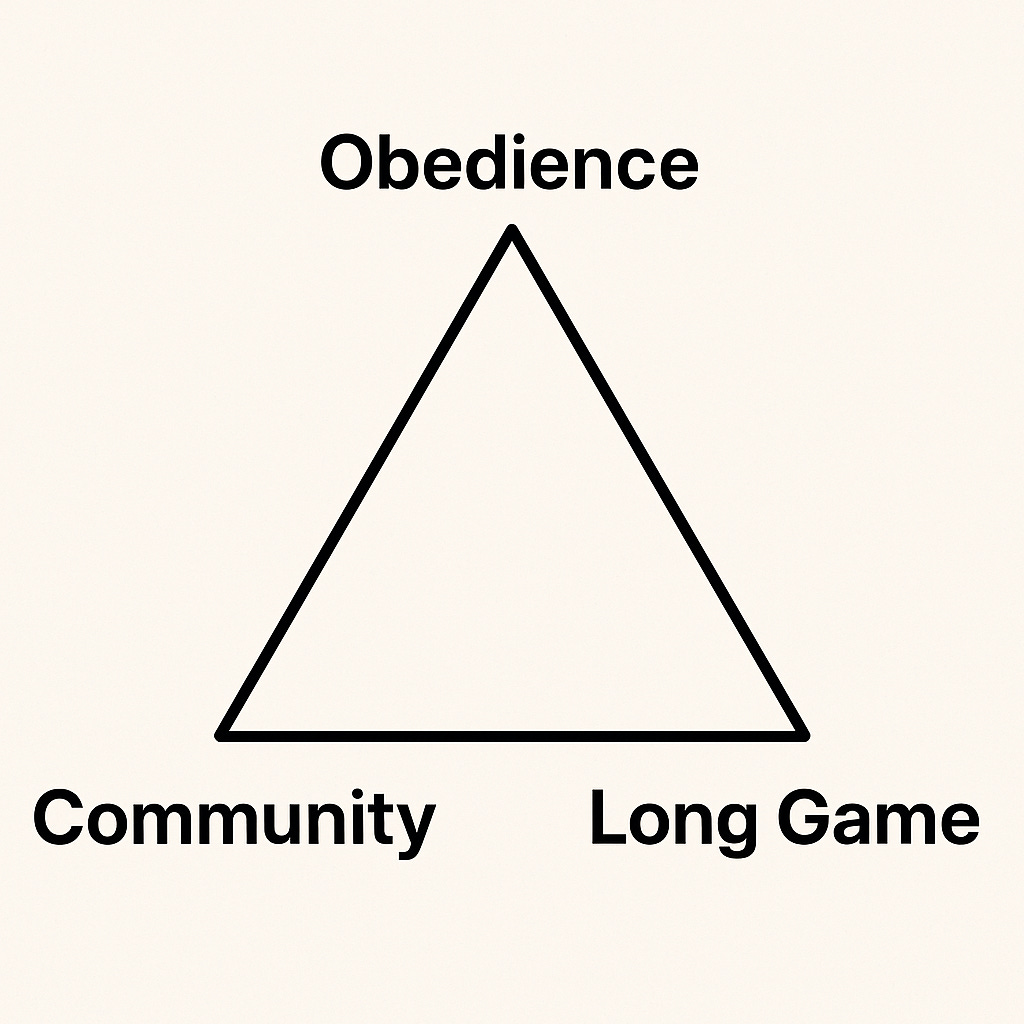The Discipleship Triangle: Obedience, Community, and the Long Game
Why real discipleship requires more than content and commitment.
My parents were trained as civil engineers. So that meant we stopped at bridges on our family trips so that they could talk about what type of bridge it was, and inspect all the details of the materials. They geeked out on bridges. They wanted to make sure that their kids and grand-kids won the elementary school competition to see who could build the strongest bridges. To do that, they taught me about the strength of a triangle. So today we’re talking about a triangle. Well, in a minute.
I bet we’ve all known someone (even if it was ourselves) who attended church weekly, wore the Christian t-shirts, went to the concerts - but didn’t live like a follower of Jesus. It’s not a lack of showing up or hanging out with the right people. It’s often about their habits. We have probably all heard that a person is the sum of their habits from an achievement perspective, but what about a spiritual perspective? What if we thought of the discipleship journey as one that involves consistent rhythms more than sporadic effort? That’s where the Discipleship Triangle might help. It’s not really an original idea, but a synthesis of what some others have suggested.1
Obedience can be costly. We talk about this at our church in our Re:generation ministry. I’ve seen obedience cost people in a few ways. Confessing a past sin (like stealing) can have a financial or legal cost. Being obedient to Christ might change who you live with. Hopefully the relationship can become a God-honoring marriage, but sometimes the cost of obedience is sacrificing the relationship at the alter of Christ.
Obedience
Obedience is more than just intellectual assent to a concept. It’s entering into communion with the God of the universe - what some call a relationship with God. Once that happens the outgrowth is deepening the relationship. The Gospel of John puts it this way:
12 But as many as received Him, to them He gave the right to become children of God, even to those who believe in His name,13 who were born, not of blood nor of the will of the flesh nor of the will of man, but of God. (John 1:12-13 LSB)
It’s a transformational relationship in that obedience to God changes you to be more like the character of God. It’s like a process where God changes you into who he created you to be through the decisions of obedience that you make in your life.
Because of the Great Commission, we might think that learning or teaching is the main part of discipleship. It says:
18And Jesus came up and spoke to them, saying, “All authority has been given to Me in heaven and on earth.19 Go therefore and make disciples of all the nations, baptizing them in the name of the Father and the Son and the Holy Spirit,20 teaching them to keep all that I commanded you; and behold, I am with you always, even to the end of the age.” (Matthew 28:18-20 LSB)
But the goal of that teaching is obedience to the commands of Christ. The goal of our learning from a sermon is that we become more obedient in the command being taught. Our obedience drives us to be more like what we see in the Trinity, thus we obey the commands of Christ.
As the first of the three rhythms, obedience is something that we must practice. Just like getting good at a sport, it takes practice. So when I read scripture or listen to a sermon (whether at church or from a podcast) I’m listening for something that I need to obey. I’m working on that rhythm in the car, and mowing the lawn. I not only build times in during the week (church on Sundays, or small group or whatever) to think about these things - I build time in daily to think of these things. When I read scripture devotionally I’m paying attention to what I need to obey more than I am to the literary and communicative aspects.
Community
Jesus walked through life with people. Some of us middle aged guys are surprised at how Jesus had 12 guys who were his best friends… but that’s another story. The point is that Jesus spent time with other people, sometimes in groups of the twelve, or the three, or with Lazarus and his sisters. I think Jesus was getting at this in John 15. At one point he says:
Just as the Father has loved Me, I have also loved you; abide in My love. (John 15:9 LSB)
That affection for other believers is to be modeled on the affection that the members of the Trinity have for each other. That is pretty incredible. And pretty serious.
In these relationships with other believers we are to act in certain ways. We are to develop certain habits in our interactions. We are supposed to confess sins to each other and pray for our fellow believers in their struggles.
Therefore, confess your sins to one another, and pray for one another so that you may be healed. The effective prayer of a righteous man can accomplish much. (James 5:16 LSB)
I think the reason for describing the practices of the early church in acts is so that we (in the later church) can imitate their behaviors. Some of those behaviors include:
And they were continually devoting themselves to the apostles’ teaching and to the fellowship, to the breaking of bread and to the prayers. (Acts 2:42 LSB)
So two points can be easily surmised: 1) We shouldn’t do discipleship alone, and 2) Someone else should know how I’m doing in my spiritual walk. You get to pick the person or persons who you know at this deeper level. For some of us it is really difficult. For Pastors and Ministry Leaders the idea that we share our struggles with another person can be tough to swallow. But its healthy. I have invited a few men into this level of relationship with me. A few are or were pastors. A few are not. I honestly share more with the current/former pastors. The point is that we all need this level of community. It isn’t a checkbox to be checked, its a relationship modeled on the closeness of the Trinity.
The Long Game
I started “reading Hebrew” in 1999. That’s when I started Hebrew 1 at Baylor. Reading Hebrew was slow, and took daily practice. It felt like I would never have the same level of command of the vocabulary and pronunciation as my septuagenarian professor. But days turned into weeks that turned into semesters that turned into years. Then, I started formally teaching Hebrew in 2014 (I think). A level of consistency enabled my brain to transform into knowing the language well enough to teach it. The point is similar to what I tell my kids: Anything worth doing takes time.
We start out on “spiritual milk” (1 Peter 2:2) and grow into a maturity that after time is obvious to all those around us (1 Timothy 4:15). Furthermore,
I am the vine, you are the branches; he who abides in Me and I in him, he bears much fruit, for apart from Me you can do nothing. (John 15:5 LSB)
So any growth that we make in discipleship comes from Christ. We must remain connected to the vine (Jesus) which causes us to grow fruit (more disciples).
I met two guys at a birthday party for my daughter. Both went to church with me and seemed like decent human beings. Neither seemed to be all that involved with Jesus stuff. Yet, both guys continued the rhythms of obedience and community from then on. Now, 13 years later they confidently lead ministry areas at church. That kind of change is possible, it just takes time! Are you giving consistent time to the habits of Obedience and Community?
Conclusion
So where are you the weakest? Do you struggle with obedience to what scripture teaches? Do you struggle to be known and know others in community? Do you struggle with consistency? Weakness in any of these three corners will cause the triangle to break down. Discipleship isn’t about [passionate moments - it’s about maintaining a strong triangle that can carry a heavy load for the kingdom.
You might be interested in a few of my other posts about discipleship featured below:
Measuring Individual Growth as a Disciple
Let me begin by saying that what I’m writing today is my best attempt to measure where a person is on the discipleship pathway. I anticipate criticism, and I hope that those of you who disagree with …
Are We Measuring Discipleship All Wrong? A Fresh Framework for Your Church
As a “Discipleship Pastor” one of the things I’m supposed to do is help my church improve at making disciples. I think the best way to make disciples is to build disciple-makers who will then partici…
Mike Breen, Dallas Willard, Gregg Ogden and others influenced these ideas.




